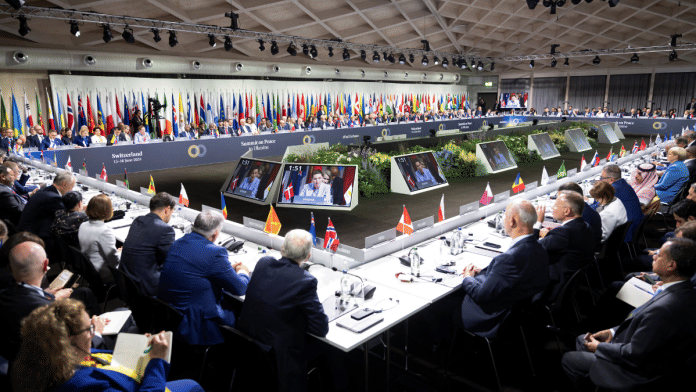New Delhi: India Sunday opted out of the joint communiqué arising from the Global Peace Summit on the war in Ukraine hosted by Switzerland. It is among 13 countries that attended the two-day summit but did not sign the final document.
“In our view, only those options acceptable to both parties can lead to an abiding peace. In line with this approach, we have decided to avoid association with a joint communiqué or any other document emerging from the summit,” said Pavan Kapoor, secretary (west) and a former ambassador to Russia who served as India’s representative at the summit.
Speaking at the summit, Kapoor added: “India shares the global concern over the situation in Ukraine and supports any collective desire to facilitate a peaceful resolution of the conflict…We continue to believe that such a peace requires bringing together all stakeholders and a sincere and practical engagement between the two parties to the conflict.”
The two-day summit (15-16 June) organised by Switzerland witnessed the participation of 93 delegations including the host. The peace conference saw 57 heads of state or government participate, while 29 ministerial delegations attended and 6 envoys were present. Most of the attendees were from Europe and the western powers.
US Vice President Kamala Harris, French President Emmanuel Macron, British Prime Minister Rishi Sunak, Canadian Prime Minister Justin Trudeau and German Chancellor Olaf Scholz were among the Western leaders who attended the summit.
However, a number of countries including China, the world’s second-largest economy and a close partner of Russia, chose to give the summit a miss. Russia was not invited to the summit.
From both the BRICS grouping (Brazil, Russia, India, China, South Africa, Egypt, Ethiopia, UAE and Iran) and the Shanghai Cooperation Organisation (Russia, Pakistan, China, India, Iran, Uzbekistan, Tajikistan, Kyrgyzstan and Kazakhstan), New Delhi was the only country to send a ministerial-level delegation. South Africa, the UAE sent envoys to the summit, while Brazil sent an observer.
A day before the summit Friday, Russian President Vladimir V. Putin announced his own four conditions for peace in the war, including the annexation of Ukrainian territories and for Kyiv to give aspirations to join the North Atlantic Treaty Organisation (NATO). Ukraine swiftly rejected Putin’s conditions.
Also read: Putin threatens to send weapons for attacks on West after Kyiv uses US missiles to strike Russia
Global support for Ukrainian position on the war
The summit was an attempt by Ukrainian President Volodymyr Zelenskyy to build a global consensus on peace in the Russia – Ukraine War before involving Moscow in further summits. In November 2022 at the G20 Leaders’ Summit in Bali, Zelenskyy outlined his 10-point peace plan for the war.
However, as the summit opened Saturday, Swiss President Viola Amherd announced a specific focus on three goals: nuclear safety, food security and the human dimension – which includes prisoners of war and the return of children alleged to have been kidnapped by Russia.
The parties to the joint communiqué announced a “common vision” with regards to all three goals.
Hungary, which attended the summit, was a part of the final document, even as President Viktor Orbán continues to be perceived as close to Russian President Vladimir Putin.
Other than India, the countries that opted out of the document were Armenia, Brazil, Saudi Arabia, Thailand, the UAE, Libya, Indonesia, Jordan, Bahrain, Colombia, South Africa, and Mexico.
US Vice President Harris, who was present Saturday, also announced $1.5 billion in additional aid to Ukraine, which included $824 million for critical energy infrastructure, $379 million in humanitarian assistance and $300 million for civilian security assistance.
(Edited by Rohan Manoj)
Also read: Don’t look at Russia-Ukraine war from Western lens. Moscow isn’t being weakened







There is the ever present risk of direct conflict between NATO and Russia. What is most urgently needed is an early ceasefire. The negotiations that will follow are incredible complex. However, a one sided peace conference of this nature will not bring peace any closer.